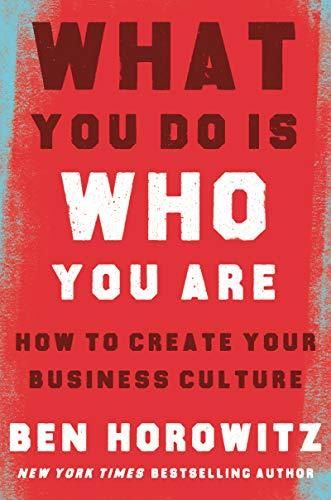Venture capitalist and best-selling author Ben Horowitz offers wit and unlikely – though effective – historical examples as part of his culture-creating advice.

Be Like Genghis!
Co-founder and general partner at the venture capital firm Andreessen-Horowitz, Ben Horowitz is the New York Times best-selling author of The Hard Thing About Hard Things. His message is that your company’s success hinges on the culture you create, whether you shape it purposefully or accidentally. Horowitz explains how to create a worthwhile culture by strategically embracing the virtues you value most.
Although Horowitz finds that culture is complex and reflects everything from office dynamics to CEO leadership styles, he approaches it practically. In this pragmatic guide, he teaches you how to assess your company’s culture and identify symptoms of a broken culture by gleaning inspiration from the code of ancient Samurai warriors, from rebellious hero Toussaint Louverture and from conqueror Genghis Khan.
Intentionally
Horowitz begins with an overview, in which he explains that your employees create your culture through the decisions they make. Their assumptions about what is and isn’t acceptable at work reveal the true nature of your culture.
Companies – just like gangs, armies and nations – are large organizations that rise or fall because of the daily microbehaviors of the human beings that compose them.Ben Horowitz
Horowitz warns that you must shape the culture you want, or your culture will form itself haphazardly. He recommends identifying your company’s goals and the actions required to fulfill them.
Horowitz offers an incongruous, though powerful, historical example of culture creation as practiced by Toussaint Louverture, a Haitian enslaved person who led a successful revolution that disrupted the culture of enslavement worldwide between the late 1700s and the early 1800s.
Horowitz posits that Louverture created a strong culture by keeping what worked and discarding what didn’t. For instance, he created shocking rules. Louverture forbade looting, which was customary at the time. He dressed like a military leader, brought in outside help and lived his ethics so everyone understood the moral code he followed and expected them to follow as well.
The Samurai
Horowitz cites another rich historical example: Japanese Samurai warriors who followed a code called bushido. The samurai, the author explains, focused on virtues they embodied through their actions. Horowitz asserts that actions, not beliefs, form your culture.
A value is merely a belief, but a virtue is a belief that you actively pursue or embody. The reason so many efforts to establish ‘corporate values’ are basically worthless is that they emphasize beliefs instead of actions.Ben Horowitz
He urges you to be specific when you outline your organization’s virtues and to provide examples people can turn to for guidance in challenging situations.
Genghis Khan
Horowitz finds another striking example in the warlord and conqueror Genghis Khan, who, in the 1200s, conquered 12 million square miles of land – from the Persian Gulf to the Atlantic Ocean – with an army of only 100,000 men.
Horowitz maintains that Khan created a strong culture by eschewing the hierarchical class-based structures of his time and running his army on egalitarian values, by rewarding his troops for their loyalty, and by including conquered soldiers in his army. Khan, Horowitz writes, valued diversity.
Horowitz argues that leaders who seek strong, loyal teams should build a system rooted in merit and achievement. He cites LoudCloud, a company that diversified its recruiting networks by hosting events for leaders of the communities from which it hoped to recruit, by having its managers seek feedback about its job criteria, and by hiring people from different areas and backgrounds.
Authentic Culture
Horowitz suggests you can build a stronger culture by encouraging truth-telling, seeking out bad news to solve problems quickly and nurturing relationships to build loyalty. He advises you to reflect on which aspects of your personality you want to include in your culture or exclude from it, and then to manage your behavior and surround yourself with people who don’t share your flaws.
Horowitz splits leaders into those who insist on their agendas, those who let everyone have a say, and those who gather input and information and weigh their options before deciding. The author urges you to be the third type.
Broken Culture
Horowitz cautions you that your culture might be broken if your employees want to quit, if you can’t achieve your foremost priorities and if your staff members’ behavior shocks you.
As a company grows, its biggest challenge becomes communication. If a member of your staff is a raging jerk, communication can become nearly impossible, because people just stop talking in his vicinity.Ben Horowitz
You can’t force people to fit your culture, Horowitz says, but sometimes your culture may need to be more open to the people your team perceives as deviant.
Success
Readers can’t argue with Horowitz’s success as a venture capitalist or author. Clearly, his wit, superb non-linear conclusion-drawing and ability to find wisdom in unlikely places spur both achievements. He has an easy way with mind-blowing and unlikely historical examples, the details of which make for entertaining reading. The reasons Horowitz raises these examples may at first seem obscure, but it’s part of his skill at engaging and satisfying readers that his underlying reasons for his choices emerge in consistently satisfying ways. Think of them, if you will, as prizes in the Crackerjack box. Horowitz imparts valuable, actionable advice, and always makes sure to include an enriching surprise.
Other valuable works on contemporary culture curation include Reed Hastings’s No Rules Rules, Peter Thiel’s Zero to One and Andrew S. Grove’s High Output Management.













